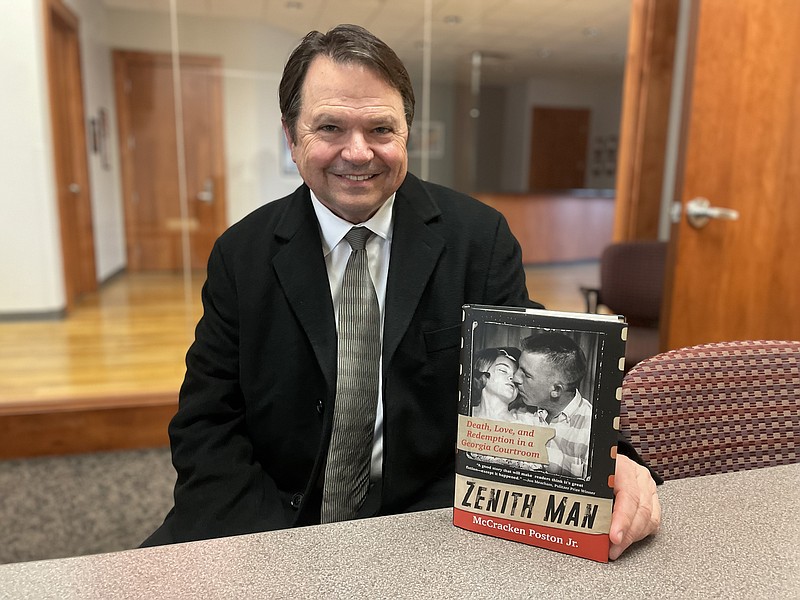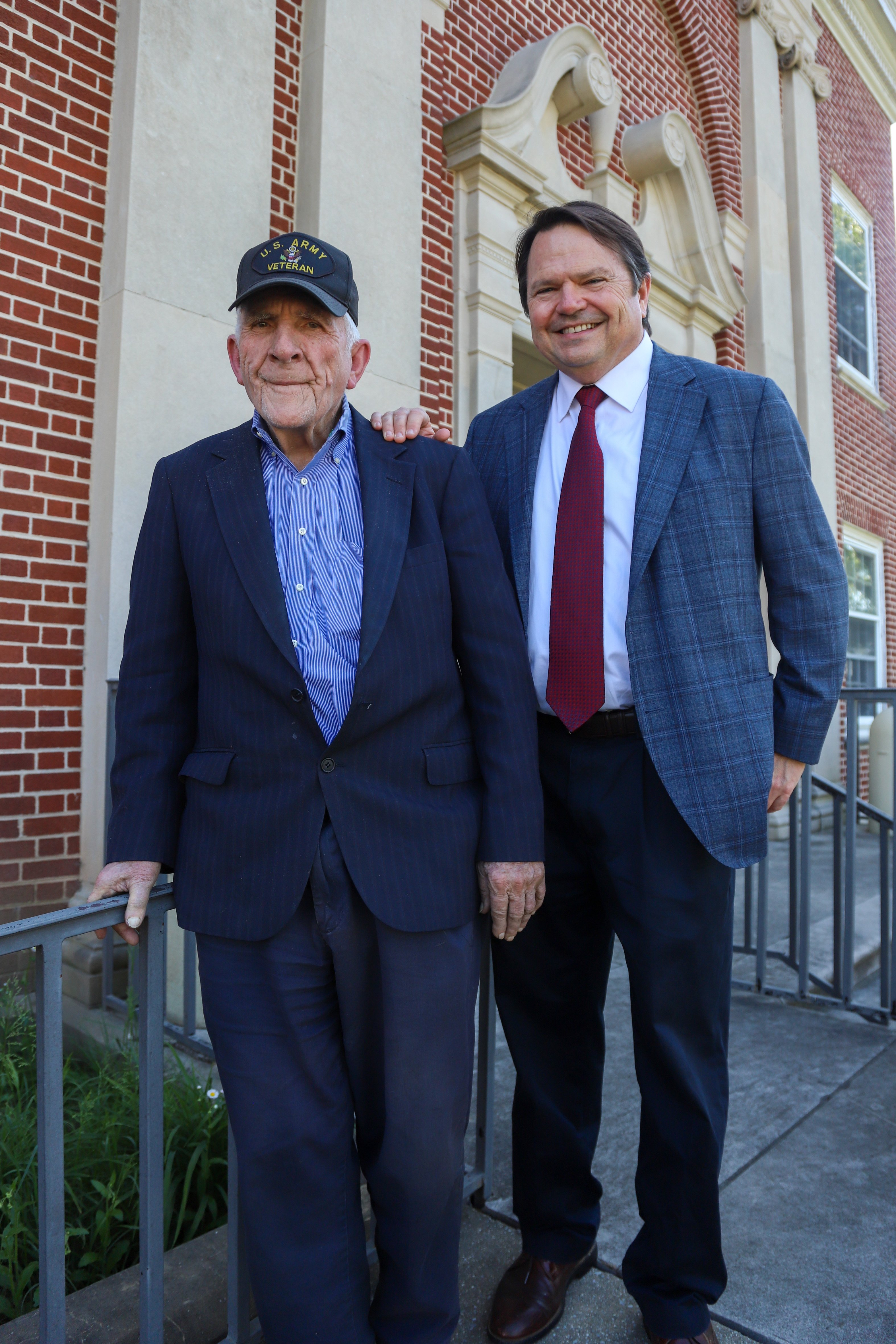One of the first childhood memories attorney McCracken Poston Jr. has of Alvin Ridley is the former TV repairman appearing in his house one day to fix a broken knob on the Poston family's television set.
The two fell into a conversation about professional wrestling, and Ridley, now 82, claimed to have met 7-foot-4-inch grappler Andre the Giant and to know the big man's breakfast preferences.
That these two, Poston and Ridley, would one day be central characters in one of North Georgia's most publicized murder trials might seem an unlikely scenario. But here we are, 25 years after the 1999 trial (and more than 50 years after the pro wrestling conversation), and a new book about the trial proceedings, "Zenith Man: Death, Love, and Redemption in a Georgia Courtroom" (Citadel Press, $28), is causing buzz in America's burgeoning true-crime online fan communities and beyond.
Ridley, who was defended by Poston at trial in Ringgold, was found not guilty of charges that he suffocated his wife, Virginia, to death in their home in October 1997 after a reclusive three-decade marriage. New information about Ridley's mental health (He has in recent years been diagnosed as being on the autism spectrum, according to Poston.) sheds light on his public persona, which is a theme of the book.
(READ MORE: Tennessee high schoolers solved a nearly 40-year-old serial murder mystery)
Before the trial, Ridley was mostly known for being a town character: a troubled child (He reportedly cried every day in fourth grade.) who later reportedly drove around town with a mannequin in his car and often posted conspiratorial writings on the walls of his TV repair shop on Nashville Street.
The Ringgold jury ultimately believed Poston's defense that Virginia Ridley, who had a seizure disorder, died of natural causes and that the couple, while extremely private, were actually happily married. Still, the fact that Virginia had seldom been seen during her long marriage to Alvin had caused rumors around Ringgold — picked up by media — that she had been kept inside the couple's house against her will. One 1998 tabloid headline falsely reported, "Sicko Holds Wife Hostage for 30 Years ... Then Kills Her."
Poston's book, 25 years in the making, is drawing positive notices from the likes of Pulitzer Prize-winning author and historian, Jon Meacham; Emmy-winning documentary maker and daughter of the late Sen. Robert F. Kennedy, Rory Kennedy; and journalist and author, Jonathan Karl.
Poston said he has also done more than 25 podcasts since the book was published earlier this year as the nation's true-crime community has embraced the project. The trial has also been memorialized on television series such as "Forensic Files," "American Justice" and NPR's "Snap Judgment." People Magazine and The Washington Post have also done articles about Ridley. Based on presales, a second printing of "Zenith Man" was ordered by the publisher before it was even released, Poston said in an interview last week.
Soon after the trial, Poston set about writing a book about the experience, but it took decades of fits and starts before it was completed and published. Several potential co-writers consulted with Poston through the years, and a Hollywood studio once secured film rights to the story, but for various reasons the projects fell by the wayside.
(READ MORE: True crime author recounts 1978 Tennessee murder cases)
It was not until author Bonnie Heard Hill advised Poston to fold his own story into the book, he said, that things began to cook. At the time of the trial, Poston was coming off a failed Congressional campaign (He lost to Nathan Deal, who went on to become governor of Georgia.) and was struggling with alcohol use and fertility issues in his then-marriage.
"I mean, I went through two marriages," Poston said in a recent interview. "Writing this book made me realize my role. I had not really faced what my roles were in the dissolution of those relationships."
The Ridley trial gave him new purpose, the 64-year-old attorney said, and proved to be a pivot point in his life. "Zenith Man" tells not only the story of a Vietnam-era veteran falsely accused of murder but also of a middle-aged lawyer searching for direction and purpose.
Poston said he knew Ridley before the trial, as did most people in Ringgold, but had limited contact with him before agreeing to defend him on the murder charges. The book details their unorthodox attorney-client relationship. For a time, Ridley would not let Poston inside his house and often required bribes to divulge information that was crucial to his defense.
Poston credits his father, now deceased, with softening his opinion of Ridley. The two had business dealings, and the elder Poston admonished his son to consider Ridley a good man who just had a different way of thinking about things.
On Thanksgiving 1998, Poston took Ridley a plate of food, and in turn, was invited into his house. Inside, Poston found hundreds of examples of Virginia Ridley's writings, which painted her as a woman of prolific thoughts and opinions.
"They seemed to be a couple that belonged together," Poston said. "I think she held the same conspiratorial views of the world as he did."
(READ MORE: 'My Favorite Murder' true crime podcast features Marion County cold case)
Ironically, it was the 1998 death of Olympic champion Florence Griffith Joyner, who suffocated in her sleep of an epileptic seizure at age 38, that gave Poston an insight into the Ringgold case. Virginia Ridley was known to suffer from seizures, and it seemed likely to Poston, and expert defense witnesses, that her cause of death was similar to Joyner's.
Today, Poston and Ridley remain friends and have lunch together almost every week. Ridley's old TV repair shop has been repurposed as a coffee shop and includes mementos from the trial.
Poston now believes Ridley's mental state may have declined after he essentially lost his livelihood to technology; when televisions evolved into solid-state circuitry, the need for repair people declined.
Today, most people in Ringgold are much more understanding of Ridley's condition and behavior. Some business owners in town are hosting an "Alvin Ridley Birthday Party" for Ridley at Caffeine Addicts, the TV-repair-shop-turned-coffee-shop, on March 19.
"Alvin is now basking in the love and acceptance he had gone without for a lifetime," Poston said.
Poston said he would like to think that had Ridley been born 50 years later, his life would have been much different. He would have probably been diagnosed with autism as a child and, hopefully, received services to make his life better.
"I think we've all learned a lot (about autism) ... but there are still like 5.5 million people undiagnosed," Poston said.
Poston will sign copies of "Zenith Man" from 2 to 4 p.m. Saturday at the Hamilton Place Barnes & Noble bookstore.
Life Stories is published on Mondays. Contact Mark Kennedy at mkennedy@timesfreepress.com or 423-757-6645.

